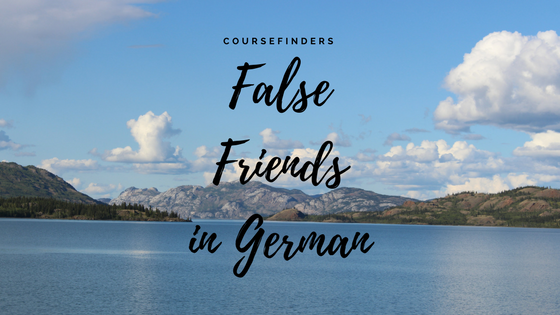If you learn a foreign language, you will find a lot of false friends. In the Cambridge Dictionary you could read this definition for a false friend:
“a word that is often confused with a word in another language with a different meaning because the two words look or sound similar”
So as you can see, there could be false friends in every language. If you want, you could read the articles in other languages, too:
- Spanish: Falsos amigos entre italiano y castellano
- Italian: Falsi amici tra italiano e spagnolo
- German: Falsche Freunde im Englischen
But which false friends can be found in German and English?
Of course there are a lot, but to demonstrate you the principle of false friends, we want to show you some examples:
#1 Das Lokal
- what it looks like: local
- what it means: pub or restaurant
If you want to talk about a local person in German, you should use the words “der Einheimische / die Einheimische”.
#2 Der Chef
- what it looks like: chef
- what it means: boss or manager
So the actual word for a “chef” in German is derived from the German verb “kochen” (to cook”). Therefore the person who cooked the meal is called “der Koch / die Köchin” in German.
#3 Die Rente
- what it looks like: rent
- what it means: pension
In Germany the English word “rent” is translated into “die Miete”.
#4 Der See
- what it looks like: sea
- what it means: tranquil lake
This is a typical false friends which can confuse an English-German-learner. The German word for “sea” is “das Meer” which doesn’t have any similarities with the English word.
#5 Das Gift
- what it looks like: gift
- what it means: poison or toxin
If you buy somebody a “Gift” it won’t be the party you’re looking for. The right translation for the English word “gift” is “das Geschenk”.
#6 Die Fabrik
- what it looks like: fabric
- what it means: factory
“Die Fabrik” is an industrial place of work. So the word for the English “fabric” is the German word “der Stoff”.
Other false friends could be also verbs. Here are some examples:
spenden
- what it looks like: to spend
- what it means: to donate
winken
- what it looks like: to wink
- what it means: to wave
bekommen
- what it looks like: to become
- what it means: to receive or to get
Come back to CourseFinders.com for more articles about languages and studying abroad.
Follow us on Facebook and Twitter and don’t miss another article on CourseFinders.com!
Find a German language school! Compare over 350 schools on CourseFinders.
